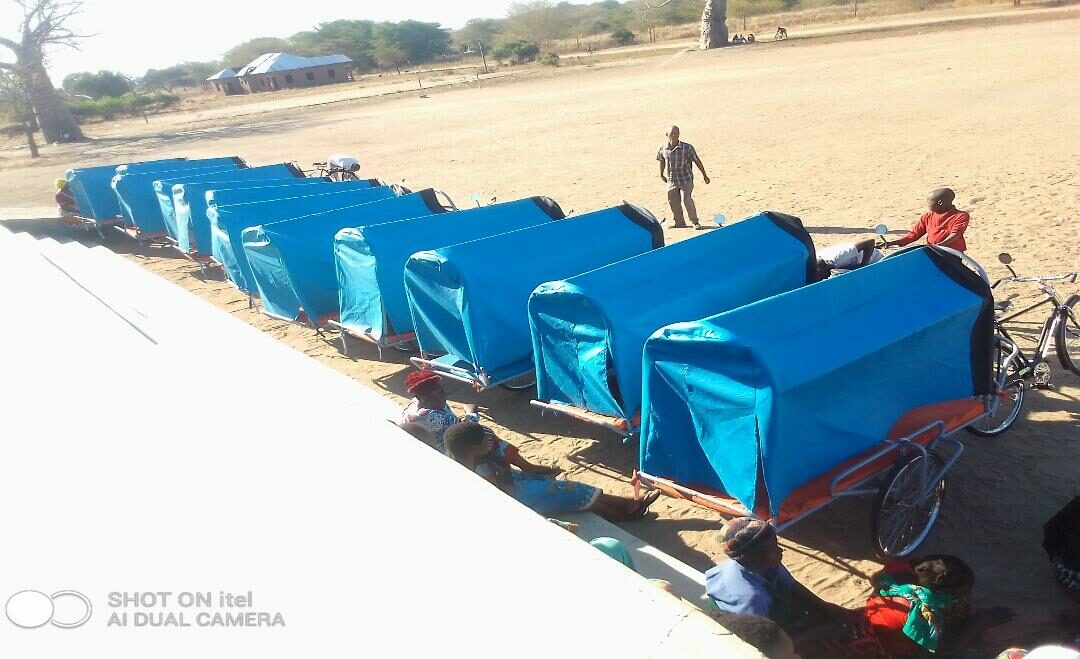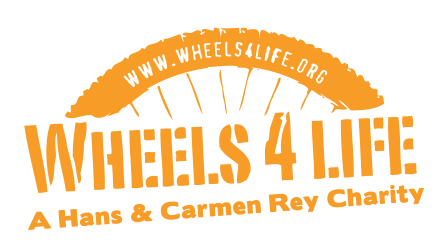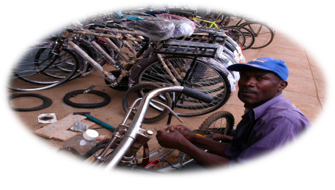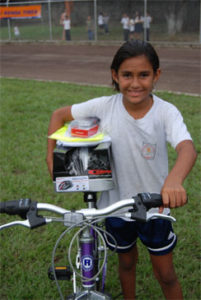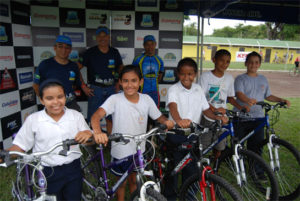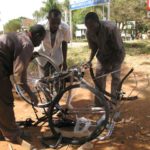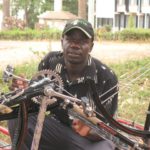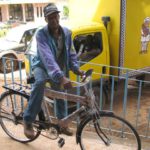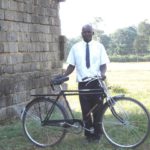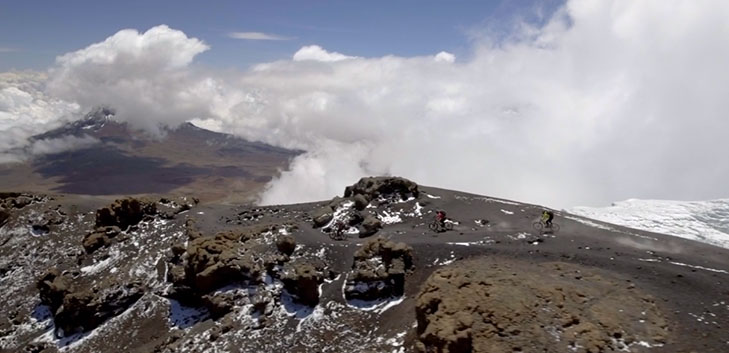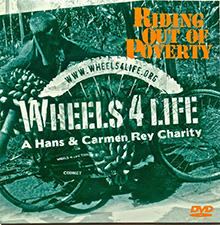Riding out of Poverty, from Kenya to Eden.
Words and photos by Carmen Freeman-Rey
It had been four years since Hans and I visited East Africa on a Wheels 4 Life trip. January 2008 saw us travelling to Tanzania, circumnavigating Kilimanjaro on our bicycles and focusing our Wheels 4 Life attention on the Ugweno Valley where we distributed a number of bicycles. In 2009 we followed up giving away more bikes, opening a bicycle repair shop and we completed our film, which covered the trips.
At this time Wheels 4 Life was a fledgling charity, just starting out at that point, we knew we had a lot to learn and our Tanzania journey set the foundations for the direction we would choose to take our charity. Neither of us had any real comprehension of what lay ahead for us, or how lucky we would come to feel to be in the position of being able to do the work we are doing.
Now in 2013 Wheels 4 Life is very different, we have learned a lot and evolved, we have an infrastructure in place with a team of field volunteers that enables us to run a charity that is pure, efficient and effective. That being said, it was abundantly clear to Hans and I that it was absolutely time for us to visit east Africa again, this time Kenya and Uganda where we have given away a couple of thousand bikes already. Our mission was to meet many of our Project Leaders in the field, a lot of our previous bike recipients to monitor first hand the impact the bicycles have had on their lives and give a whole lot more away at the same time, 270 bikes to be precise. We also wanted to learn, about the countries, the people, their needs and character. We are often asked the questions; “Can we make a difference, are we making a difference?” The answer is yes; most definitely we can and are. If Darwin’s theory of evolution concluded that the fittest would survive, we believe that it is the moral duty of the fittest to help those less strong to survive.
Exhausting, hot, dusty, indescribably bad roads, cold showers, cockroaches the size of rats; that’s the negative. Gratitude, love, happy faces, hugs and witnessing the incredible difference our bicycles have made; that’s the positive.
Of course, it would be unthinkable for us to visit Uganda, a first for both Hans and myself, without taking his bike. Our “day jobs” allow us to cover our own Wheels 4 Life expenses and we took this opportunity to combine our work for the charity with a little Hans Rey adventure on Uganda’s Mount Elgon, a place that can only be described as Earth’s Garden of Eden. But more of that later.
After a grueling journey that saw us fly from California to Kenya via Amsterdam, we finally arrived late at night in Nairobi. Tired and in desperate need of a shower we were greeted by our Kenyan driver, fixer and security, Johnnie. I felt a little alarmed when approaching our hotel when first we had to negotiate concrete chicanes and armed guards just to get into the car park. Then faced with full airport type security with our bags X-rayed and us swiped with metal detectors just to get to the reception I wondered exactly what we were coming to. Another 5 electronic gates and various locks before we could enter our room instilled in me a healthy sense that we should watch our backs and our bags.
Our first full day began with our cameraman Rob meeting us at breakfast straight from a red eye from England. He came along to cover our journey on film as a follow up to our 2009 movie “Wheels 4 Life, A Story About Giving”. A quick cup of tea and we hit the road with Johnnie in his trusted Toyota to an area called Ndeiya north east of Nairobi. As I mentioned before, we were meeting up with some of our project leaders and one of them was Bishop Francis Kamau.
We started working with Bishop Kamau in 2012 thanks to an introduction from an Australian based charity. He is a fine example of a man who grew up in abject poverty but through education and determination moved away from a life that would have meant scraping together a living as a seller of home grown produce or charcoal. After studying in Nairobi and the United States he returned and turned his talents towards helping many communities in a number of African countries. Francis took us to the grounds of a church in Village #4 Ndeiya where we met some of our previous bicycles recipients and gave away another 40 bikes. It is important to us to know the identity of every person who receives a bike from us and how they will use it; our project leaders follow up with them and report back to us about what has been achieved thanks to the gift of transportation and also how their bikes are being looked after.
At Ndeiya we were able to meet a boy named Sami. When Sami was 9 his Father died leaving him with a Mother who had a breakdown, a disabled sister and another sister who was still a baby. He became the sole provider for his family; he did this by fetching water or firewood for his neighbors in return for a small fee. Now Sami is 13 and still going to school despite the daily challenges that face him. We gave him a bike, now he can carry more water and firewood for his neighbors in a fraction of the time as a result his daily income has increased four fold.
After another night in Nairobi we headed west in the direction of Kisumu, after approximately 200 km we arrived at a remote village, Solei, which is near Nakuru. Again Bishop Kamau met us there and introduced us to some of the people that previously received bikes. They were positively joyous to meet us, the people from America that gave them their bicycles. They were so grateful, not just for the bikes, but because we had travelled so far to come and spend time with them. In Solei we distributed another 30 bikes. Bishop Kamau then took us on a tour of the area so that we could meet a few more of the people that had bicycles from us the previous year. We probably only drove for about 30 miles, but these aren’t roads, they are deeply rutted dirt tracks and we spent hours being jolted around fearing that the car would coming to a grinding halt in our pursuit of meeting our bike owners. One such person was Simon, we found him on a building site in Ngugi. Simon suffered a stroke 10 years ago and we could see that he had restricted use in his left arm and leg, but that doesn’t stop him from riding a bike or working. He uses his bicycle to get to the construction site wherever the crew is working, he explained that at the moment it is not so far from his home, only 4 miles, but his last job was 12 miles away. I asked him if his son would follow him into the building industry, he said “Oh no, I’m working so that I can pay for his education and he can have a better job, a better life”.
It was time to say our goodbyes to the very hard working and dynamic Bishop Kamau and make our way to Katito near Kisumu western Kenya. We were quickly learning that no matter what satellite navigation devices tell you, if it says a journey will take 2 hours, double it…at least. But without a doubt this journey was made pretty special when we came across animals that we normally associate with nature reserves. Zebra were calmly crossing the main highway, is this what they mean by “Zebra Crossing”? To our left were Wilderbeast and Antelope, to our right Giraffe munching on trees.
We were hoping to reach Katito which is where Orucho Hills is located well before nightfall. The Kenyan roads once again dusty and full of ruts and potholes had other ideas. As we drew nearer to the village, which is situated not far from the shores of Lake Victoria it became evident that things were changing. Not just the weather but also the personalities of the people. Faces that held hard stares instantly reminded us that this was the epicenter of the election riots that caused havoc a few years before, they were replacing the happy laid-back characters we left behind. Dry dusty roads gave way to muddy beaten tracks; our driver was un-phased as he battled his way through a maze of twists and turns, tires sloshing through the muck and flinging sods of earth up on to our windscreen. There is something surreal about approaching a remote community in the blanket of darkness with the sounds of a storm brewing and humidity surrounding us like an unwelcome soggy cloak. By this time we were once again tired after a long day, our bodies felt battered from being bounced around on the bumpy roads and it had been 12 hours since we had eaten anything except a few shared Clif Bars and sugar cane stalks.
The Orucho Hills Center and surrounding satellite projects have received 450 bicycles from us over the years. Run by Pastor Joseph Onyango, his community was chosen by the Rory Walworth Memorial Fund in England to receive the bicycles they had been raising money for. Tragically Rory Walworth died at the age of 19 in a mountain biking accident; his family wanted to do something special and positive in his memory. We are so honored that they chose Wheels 4 Life as the charity to administer the money they had raised in the best way possible. What was to be a few bikes turned into a few hundred thanks to countless fundraising events in Great Britain. Now there are 450 bicycles and approximately 2000 Kenyan people being helped thanks to Rory. That is quite a legacy, no wonder the Orucho Hills Center have named their community square The Walworth Foundation Square, planting trees and setting tables under their shade.
Joseph Onyango could not be more different than Bishop Kamau, whereas the Bishop asked for nothing, Joseph asked for more, and more, and more. We couldn’t blame him though, his community is desperately poor and his philosophy is to get as much as he can. In his bright fuchsia pink Reverend’s garb holding court to the more minor Pastors from further afield and local Government big wigs, there is a definite sense that Reverend Onyango enjoys the elevated status that having the ear of Wheels 4 Life gives him. But there is no doubt that he is looking out for his people and working hard. He helps us to get the bicycles to the people that really need them and if he gets extra community clout and a few extra pineapples and bananas from the villagers because of this, that is fine with us.
Mud hut, cockroaches that look as though they could eat a small dog, spider nests, a toilet that I will leave to your own imagination and an electrical storm cracking above the tin roof right above our heads. Oh and the mosquitoes, lots of them. This is how we spent our next night. Hans is more hard-core than me, not frightened of spiders and he doesn’t care about the loo but even he was grateful for my hand sanitizing wipes! I lay there wrapped in my sleeping bag with the hood pulled up over my head tight, like a caterpillar in it’s chrysalis I tried to resist the urge to shine my torch on the spiders and zone out the incessant buzzing in my ears of the blood hungry bugs. One plus though, at least the floor of the hut was dirt so if the lightening hit the corrugated roof we would be earthed, wouldn’t we?
After a pretty rough night we woke to the 5am pre-dawn sky, today we would donate 100 bicycles from Rory’s fund, we even had a tree planting ceremony to commemorate the event. There were so many bikes; along with the new there were a number of older bicycles that we gave away throughout the previous years. Three other Wheels 4 Life project leaders had travelled to meet us at Orucho Hills and we benefited from a round table discussion about the difference our bicycles have been making, the great need for more bikes as well as explaining to them that although we would love to be able to give so many more, raising the funds is a huge challenge.
It had been our plan to spend another night in the hut with the bugs, but having learned our lesson, that every journey takes twice as long as we anticipated, we made the decision to get on the road and head to the city of Kisumu that night. We still had 180km to cover before we would arrive at the Ugandan border. Plus, to say we smelt bad would be an understatement, disgusting would be a better description and our skin now resembled the red dirt we had been walking in for the past few days.
These trips make you appreciate the simple pleasures in life so much more, a warm shower, a tap you can simply turn on and a comfy bed. Ecstasy, I think that is what we all felt that night when we rested our weary heads on a soft hotel pillow.
As suspected the drive took longer than we were informed, but we were horror struck when the line of lorries spread out before us farther than the eye could see. 7km to border said the Tom Tom. What? How can that be? It wasn’t kidding, turns out a lorry had overturned about 5 KM further up and everything had come to a grinding halt. But we had our heroic driver Johnnie, who negotiated every ditch and gap between these hunks of metal like a seasoned Dakar Rally driver to get us to the Uganda crossing in time to meet Daniel our driver for the next leg of our road trip.
Woo hoo moment, we were finally in Uganda and on our way, but the delight soon turned to disbelief when we spent another two hours at a standstill in 90f heat, no air conditioning, windows open and exhaust fumes chugging away and choking us just to reach the exit of border control. We thought the roads in Kenya were bad but the road from Malaba to Mount Elgon, Uganda gave us a whole new perspective on road standards. We rattled, bounced and groaned our way at the rapid speed of 20 mph to the Sipi River Lodge situated 1795m up Mount Elgon and our host for the next 2 days, a British expat named Will. “We were expecting you for lunch”, no kidding, it was now 4pm, like I said, journeys take a lot longer there. Close your eyes and imagine a verdant countryside, rich soil, everywhere lush and vibrant, water thundering down from high falls and then flowing into a river where it gently cascades over rocks. Imagine a garden that every gardener would dream of having with every plant, flower and fruit growing; this is nature’s garden and to us it was the embodiment of the Garden of Eden. Our travels have taken Hans and I to some truly spectacular places, this is right up there, as near to perfection as you can get and no mosquitoes and not many snakes.
After our boneshaker drive we were more than ready to get our boots on and Hans’ bike out and head for the slopes of the mountain. Time to get the camera out and Hans to get into action. What I haven’t told you yet is that for this trip Hans was taking with him the, at that time, new top-secret GT Sensor 650B, with the revolutionary newly designed Path Link. A complete innovation, this was the only such bike out there and we had to keep it under wraps while we filmed and photographed it. Every photographer drools over stunning locations, great light and fabulous colors to work with and Hans drools over having plenty of locations to do his thing and ride the ride as he does so well “No Way” style. He wants to explore the amazing trails that our world has to offer in the pursuit of the ultimate rides. Well both he and me were officially in heaven! No lack of locations here, the only lacking we had were daylight hours left remaining, two hours until sunset and we were like kids in a candy store with me saying “lets do some here, lets do some there” and Hans ever the professional, game to give anything a go no matter how wet, slippery or out and out sketchy my chosen shot location could be. Before we knew it, darkness descended and we had a steep climb down for Rob our cameraman and me and a ride down for Hans. Piece of cake for Hans, he doesn’t need light, he senses the lines of the trail by some kind of osmosis. That evening we were all on a high, we had so many great shots already and we were all a little stunned by the sheer beauty of this place. We couldn’t wait until the morning to explore the locations Will had in mind for us.
The Sipi River Lodge is an exquisite place, a collection of cottages scattered along the hillside acreage beside the stunning Sipi Falls. Built in the Ugandan style with thatched roofs, slate floors and batik fabrics they offered comfort and simple luxury against a backdrop so awesomely stunning that it will forever be imprinted in our memories. Indeed the view out back from our terrace was of the cascading waters in their magnificent glory. A beautiful evening was rounded offwith us drying our shoes by the fire whilst enjoying a shepherd’s pie and a glass of wine. Life felt good.
Equipment ready, bikes checked over, stomachs full of eggs and bacon, we loaded our bikes into the 4 x 4 and shuttled to the top of one of the many plateaus on Mt. Elgon. Will had figured out a route for us that would include following trails carved into the red dirt that flowed along meadows, through villages, across rivers, along waterfalls and through the forests. With each turn we would gasp at the loveliness of this place and be thrilled that we had found such nirvana flying under the radar of mass tourism. It seemed that as we rode these natural flow country trails we collected a following, like the Pied Piper, children followed Hans in awe of the amazing things that this Muzungo could do on a bike.
Even though a bicycle is a form of transportation used globally and pretty much everyone knows what one is, you have to understand that the people on the mountain had never seen a bicycle quite likes Hans’ GT Sensor. In fact the world at this point had not seen this new Sensor.
Having Will with us was such a bonus, he understood entirely what we wanted; that it was important for us to explore and get a real feeling for riding this volcanic area which is a National Park but allows Mountain Biking. He knew that we wanted incredible locations that we could capture with images to share with people and show them this amazing place with such great riding terrain. There was an abundance of natural beauty everywhere we looked, we joked that this is what our garden in California would like to be when it grows up. Mt. Elgon is a huge volcano, with a diameter of 80 km across, it stands at 4,321m or 14, 177’ above sea level, it also has one of the biggest intact calderas on the planet and it is the largest and oldest solitary volcano in east Africa. Straddling both Kenya and Uganda with the summit being on the Ugandan side, this is a behemoth of a mountain. Now you can understand why having a local guide made things so much easier for us.
If you imagine a giant’s staircase up to the Heavens, then you will be able to picture the first 2500m of Mt. Elgon. A series of steep cliffs ascend leveling off abruptly into vast plateaus that expand before our eyes. From each plateau waterfalls descend, millions of gallons of water thundering over the precipice until landing uproariously into giant pools that then flow into rivers….until another big drop when the process is repeated again. At one of the many panoramic vista points we were able to look out over a landscape that seemed to stretch into infinity, far below the sheer drop we could just make out the small dots on a hillside opposite that were in fact the cottages we were staying in.
It was at this point that Hans said “Oh cool, what an awesome view, let’s take some shots here”. What he was suggesting was to ride along the edge of the steep cliff with the waterfall and epic panorama in the background. It was here that the only two tourists we saw on the whole trip happened to be sitting and taking in the view. “Are you mad?” they asked. Good question and even though I know after all these years to trust that Hans knows his limits, it is sometimes hard to switch off from being his wife and thus being terrified for his safety. One slip, one wobble and it would all be over, lights out and goodbye world. But I also understand that this stuff thrills Hans and is part of his make-up. I had to get my professional head on, adjust the light, frame the shot and direct, not think about what Hans is doing, and just think about getting the shot. Well get some shots we did and of course one idea leads to another, it gets a little addictive, you want to do more and more and even I got a little comfortable with the danger and forgot my fear. I looked across the abyss at the falls and asked Will if it would be possible for he and Hans to go over to the other side and ride along the fall’s precipitous edge at the point where the water tumbled into the void. “Oh, of course, follow me”, he said. So off he and Hans went, whilst Rob and I stayed put ready to put on film them in the next precarious location. Well, it was pretty incredible and worth the excursion.
On we went through tiny villages where the inhabitants waved and cheered and seemed quite happy that we were taking over their little trails and taking photos, Hans skidding through the berms and kicking up the dust. Open green meadows gave way to fields planted with bananas, the trail twisting and turning; we never knew what would be around the next bend. Hans stopped suddenly and said “yeah”, I caught up and saw what he was looking at, a fallen tree lying across the river creating a perfect natural bridge and giving Hans the opportunity to implement some of his trials riding skills. Big kid that he is sometimes, he put smiles on all the children watching him balance and counter balance as he kept his line above the water.
Peddling on I was moaning about the loaner bike I was on, no brakes, much too small in the frame, too long a stem, and a hardtail, I was saying over and over how much I missed my Zaskar that was back home in California. I had just taken a tumble that gave my rotator cuff a wallop and was not feeling the love for this borrowed bike I was on. Oh how I wished I had my bike (Zeberdee Zen) so that I could properly enjoy these fabulous trails to the max. Finally Hans took pity on me, “Would you like to have a go on my bike?”, he asked. Are you kidding, I was off my clunker quicker than you can say “full suspension rocks”. I hopped onto the Sensor and peddled like a happy kid,” wheeeeeeee” I screeched in delight. If ever there is a great time to fully appreciate how the technology of these bikes has progressed, it is a situation like this. Ride a bike that is 15 years old for a few hours and then get on the latest machine, oh my goodness; I was stunned at the difference. I whizzed up the hill and into the forest, having to wait for people to catch up. Trust me, this doesn’t happen often. Popping over the ruts and roots on the forest trails, I couldn’t believe how much fun I was having. Sadly after a mile or so I had to give Hans his bike back. To add insult to injury Hans had the bright idea that I should have a go on one of the bikes belonging to a local that was giving us the curiosity eye at the gates to the Mt. Elgon National Park. One minute I am writing a nice message in their visitor’s book and the next I’m petrified as I try and ride what is the standard mode of transportation there, an Avon bike, but this one was without pedals or brakes. As Hans would say “brakes are for chickens”. Indeed.
We were coming to the end of our incredible day. The previous afternoon Rob our cameraman and I stood looking across the river canyon, looking up at the steep trail opposite that lead to the top of the waterfall. We jokingly said, “You know, we can just sit here and enjoy the view and film Hans riding down that steep descent without having to go anywhere”. A quick discussion with Hans and Will and we decided to do just that. Rob and I would ride ahead taking the easy but circuitous route back to the Lodge and set up position to film them from the other side as they rode the trail back down to the river. Using my lens as binoculars, I could make out a slight dot on the horizon, which was a long way away. It was apparent that even to Hans this descent was a challenging one. Once again I could see that he was applying some of those trials riding skills. Eventually the red dot that was Hans was seeable to the naked eye, the flash of colour between the green foliage getting bigger as he came closer. Unfortunately it proved a little hard to shoot since the plants and shrubs were so high and Hans was obscured from view much of the time. Once again we felt in a celebratory mood, we had an amazing day, got a lot done and we fully appreciated just how lucky we were to be able to experience this incredible place.
Sipi gave us a chance to re-group, charge up equipment, wash our clothes and get a couple of good nights sleep. All very necessary for soon we would be on the road again, this time heading to Kampala the capital of Uganda and a meeting with our next Wheels 4 Life project leader, Agnes at ARUWE, Action for the Rural Empowerment of Women. At this point I think it would be prudent to explain a little of how Wheels 4 Life works. We deal with small projects aiming at getting bicycles directly to people that would not normally be on the radar of the larger charitable organizations. This means we partner up with people in the field, our volunteer project leaders. They come to us either via recommendation from charities all over the world that had already worked with them or through an application they make to us directly. Each application process takes approximately a year until a decision is made as to whether we accept or decline it. Background checks are made; references, IDs and registration certificates for their organizations are supplied. For a first time project we would only supply perhaps 20 bikes. Bicycles are always purchased locally by our project leaders; this is to ensure that spare parts are easily available, we fuel the local economy and we save on transportation costs. I would send funding for 10 bikes and request that the receipt for these are sent to me immediately, they would then number the bicycles and allocate the number to the individual new owner’s name. A report with photos is put together and this together with the list of names is sent to me. Once all this has happened satisfactorily I will send the funding for the next 10 bikes. If this first project is a success and I am given updated reports on the impact the bikes are making, if they are well looked after etc, I will invite the project leader to apply again a year later for more bicycles, if there is a genuine need for more. This system has lead to us working repeatedly with the same leaders on many occasions. Therefore it is absolutely vital that we can trust the people we are working with in the field. Over the years I have exchanged many emails with our volunteers and you develop an understanding of the personalities of these individuals. I am always pretty certain I can trust the people we work with, but you can’t beat actually meeting them in person and in their own environment. Speaking with the people that actually have benefited from our Bikes is also invaluable. To be able to finally say hello to so many was very emotional for us, such a wonderful and powerful experience and I am thankful to say that my instincts are correct and that we are working with some truly amazing people that are selflessly working hard to help their communities to have a better life as we are through the gift of a bike.
Agnes was introduced to me by a Canadian charity back in 2010 and she has received 141 bicycles from us since that time for voluntary health care works. They use them to go out into the villages administering medication and vaccinations, pre and post natal care and education on disease prevention and family planning. On this particular trip we had various items on our agenda; meet the workers who already had bikes from us, give away another 50 bikes in two different locations, and have a bike race with Hans and some of our bicycle owners. Back in the United States a group of avid cyclists formed a team that would compete in races over the summer season in California. They wanted to raise money for Wheels 4 Life and specifically chose ARUWE to receive the bikes that would be bought with that money.
It was Thursday morning, a week since we began our journey and once again we were anxious to be able to stretch our legs after being on another long and uncomfortable car drive the day before. Unfortunately though after a meeting in Kampala with the ARUWE team, we soon learned that we were about to spend another two hours in the Toyota. As with all of our projects, we were headed to a remote location, this time Busi Island in Lake Victoria, the second largest lake in the world. The drive was worth it, this day turned out be one that is unforgettable. Arriving at the Mabamba landing site, Hans, Rob, Suzanne our co-coordinator and I climbed into a long canoe fitted with an outboard motor. Chugging along at an idle speed we passed through a narrow channel cleared between the Water Lilies and reeds. Gorgeous purple and pink flowers squatted on deep green Lily pads creating a carpet of colour on the water’s surface. Above us Kingfishers and Weaver Birds flew and we were instructed to look out for the Shoebill, which is apparently near to extinction. This was fun and we were happy, what a wonderful way to get to one of our project sites. After 20 minutes we docked at Busi Island; now what? we wondered. Suzanne explained that next we had to take the Boda Boda, a motorbike taxi service whilst Hans could use peddal power courtesy of his bike.
I admit it, I felt a little like a celebrity when we pulled up to the grounds of the clinic, people clambering to shake our hands and greet us, everyone so happy that we came; “You are Carmen”, I heard over and over again. Like for me, it was a big thing for them to finally meet the person that they had been corresponding with for the past three years. Most of us have seen photos or news images of what these clinics look like, basic equipment, decrepit beds, soiled linens and very ill people. Poking my head into one room I witnessed a Mother lying on a cot with her baby and a child that looked about two years old. The older child was attached to a drip, the baby looked at me questioningly as the Mother dozed.
Hot and stuffy, humidity levels are high here creating an oppressively cloying atmosphere in this room. The baby has Malaria, all too common in this part of Uganda where we are so close to so much water. Once again choking up with emotion I am finding it hard to not show my distress as we move from room to room.
Minutes later Hans and I entered a larger room filled with seated people holding homemade banners saying thank you. Thank you to Wheels 4 Life and to the many people that they know have donated to us and thus have made it possible for them to have bikes. They were all voluntary healthcare workers. Some had been given bikes last year and some would be receiving one that morning. “This is why we are doing what we do”, I said to Hans, now my tears of sadness were being replaced with happy tears. It felt so good to see how elated these people were to see us and to be able to thank us for their bikes. The Ugandan government does provide funding for the building, doctor, nurse and the medication, but the villages on the island are so spread out that the medics cannot possible visit all their patients in the widespread area Often the people are too sick to walk to the clinic, so a programme was introduced to train volunteers to cover these neighborhoods and do the basics. Vaccinate, provide drugs, dress wounds, educate about hygiene, disease prevention, family planning and evaluate which people need to go to hospital. Action for the Rural Empowerment of Women asked the government for 100 bicycles for their workers, in an interview Suzanne summed it up, “The Government gave us 5 bicycles and up until this day Wheels 4 Life have given us 89”. This means that each health worker can travel four times as far and four times quicker than before resulting in visiting four times as many patients…are we making a difference? You bet we are.
Time for a little Hans magic. One of the many great things about Hans and his bike is that as soon as he gets on it and starts pulling his wheelies and back wheels hops, people are delighted and excited. “He is very good at this” a few people said to me in all seriousness, “Yes, I explained that is his job”, you can imagine the strange looks I got at that comment. At the same time we had to advise people not to try this at home, he may make it look easy, but it isn’t. Hans made the day for some of the children when he let them have a little spin along the driveway on his unusual bike, I can only liken it to the equivalent of us normally driving a 70s basic Ford and then driving an Audi R8. No, I haven’t driven one either, but you get the picture and no insult to Ford intended. Little Thaddeus Kayemba after a few wobbles soon got the hang of it and I began to fear that we would never get him off the thing. Time to depart and head back to Kampala with our entourage of excited children trying to keep up with us on the way back the canoe on our Boda Bodas. We sat in that boat with silly grins on our faces; the general consensus was that this had been a marvelous day, absolutely classic.
It was still dark on Friday morning as we readied ourselves for another day. This time we would be in Agnes’ hands and as my primary contact within the organization; I was really looking forward to meeting her. She is a gem, warm hearted, hard working, cheerful and fun. We are very lucky to have her in our team and we are definitely going to be sending funding for more bicycles her way. Today she was going to take us to Kyankwanzi, 252 km north east of Kampala; or 4 hours in the car. Thankfully this road was a nice road, we really came to appreciate tarmac on this trip because it was so illusive. Furrows the size of canyons and potholes the size of craters were becoming the norm to us in Uganda. But apparently oil had been discovered up in this region and therefore the Government built a nice smooth access road for it; money talks as they say.
Friday was race day; pulling into the compound of a school we could see 40 new bikes lined up, numbered and ready to go home with their selected owners. Alongside them were a good few bikes that we had given before in 2011. We were greeted again by a lot of elated voluntary healthcare workers and also the local Government chief who we heard is a good man, actively working to improve his county and not just talk about it. We could tell that he was genuinely ebullient to be there and thanked us profusely for all that Wheels 4 Life has done and is still doing. He implored us to keep working with them and assured us of the very positive results that were being achieved thanks to our bikes. As the bike receivers lined up and signed their contracts that bind them to an agreement that they will maintain, keep safe and not sell their bicycles, Hans was getting his race face on. We mentioned that we had prizes, oh boy that upped the excitement level, the prospect of winning some Adidas sunglasses (top 3) and various treats for the other participants really made their competitive side, kick in. As Hans anticipated, the Kyankwanzians really know how to pedal….fast. Our cameraman and I were following on motorbikes trying to capture the whole thing on film; that sounds easier than it is in practice; I mentioned the potholes and ruts didn’t I? And the race was won by the gentleman in the pink shirt, we aren’t including Hans in the line –up, that wouldn’t be fair, but yes he was the fastest…by a whisker. There was a positive party atmosphere at the finishing line, everyone excited and having a good time. As they say, there were no losers; everyone came away with something that day, a bike, a prize or one of the items of clothing that Hans and I had been amassing over the year specifically to give away on this trip. It certainly felt good to see so many animated and happy people.
The ride back to Kampala gave me the opportunity to really talk to Agnes, about Uganda, the people, politics, how they came to be in the situation they are in today, the progress made and the long-term plan. The Ugandans are lovely people, cheerful, mellow, agreeable, not at all confrontational, a nation that has seen far too much suffering, fighting and fear since the 1970s; now they want to live, let live and be harmonious with their neighbors. Something struck me very early on; I carry sweets to give out to the village children on our excursions. In both Tanzania and Kenya the children would jostle each other out of the way to get to the candy. Some would be sneaky and go to the back of the group with the hope that I won’t recognize them in the furor and go for round two. In Uganda the children would wait patiently in a row for me to hand them the sweet, then they would drop into a kind of curtsey and say thank you with a gigantic smile. If one of their friends hasn’t had one yet, they will push them to the forefront so that they would not be left out. It is important to understand the psyche of the societies that we work with and the challenges as well as the positive points of any country we give bikes to. We loved Uganda and adore its people and for Hans and I this trip re-inspired us to work even harder to get more bikes to them.
A little about Uganda; a once prosperous nation, it was generally looted by Idi Amin in the 1970’s, a person most people have heard of, he became Uganda’s third President after launching a coup against Obote. What followed was the exile of Asians and British, expropriation of their property and bank accounts, mass murder of ethnic groups and the disappearance of people that spoke against him including journalists, academics and students. The source of the Nile became synonymous as a body dump rather than has the mouth of one of the greatest rivers of our world. This part of my essay doesn’t get any prettier; the LRA, Lord’s Resistance Army had been a force of terror for years, locking Uganda in a civil war. Initially it was forged as an opposition to the NRA, the “National Resistance Army” operated by the Ugandan army. To be clear, the NRA was the first to recruit child soldiers, rape, murder and control through fear. The now infamous Kony lead the group formed ostensibly as opposition to this for years, the LRA. He ordered the abduction of children who were to be trained to become killing machines, why children? They were easy to replace, if they were killed they would simply raid another school, pillage another village, they were easy to control, threaten their parents, decapitate a sibling’s limb and almost certainly a child will do whatever they were asked to do. After years living in a jungle, being deprived of the moral guidance of parents without their love or affection, where survival and fighting a war is normal life, it is no wonder that these children immerged damaged and mentally scarred when rescued. 10,000 children, imagine this, it is almost too painful to imagine. Within this story you will see images of many children, the reality is that these former child soldiers were just like this once upon a time. To be absolutely clear, this is still happening; children are still being abducted, for violence and fighting, for the sex slave industry and for the harvesting of human organs. It is ugly, but we are cannot ignore ugly, we can’t live in denial. It isn’t just the campaigns of movie stars that can bring on changes, we all can, every single one of us has the capability to do something, no matter how small, and something is always better than nothing.
At this point I would like to introduce you to Ogwal Moses, he has worked with Wheels 4 Life since 2008. Ogwal is situated near Gulu, the heart of the area decimated by the conflicts within Uganda. He contacted me asking for bicycles for his youths that lived through the worst of the internal conflict. The objective was to re-train. Psychologically and vocationally; to give them the tools to move forward with their lives having the ability to cope with the memories of what they had endured and the skills to work at a job that would provide them with an income for life. Many of them no longer had families; they were slaughtered in the ongoing civil battle. How could we not help Ogwal? Of course we had to and we did, over and over again. He is a character; such charisma, dedication and enthusiasm for life and his work helping his people move forward to a new and better life. I wish so much that anyone reading this article that has donated to Wheels 4 Life could meet Ogwal Moses.
We understand the doubts that people have about the ability of charities to make a difference, about the true impact they are making and exactly how much of each donation goes to the actual cause. We ask you to trust Wheels 4 Life and take a leap of faith, to believe in us and in them, the difference being made is profound, the need is admittedly endless, but we all have to start somewhere and a little is better than nothing, a little can grow into something big. What started for Hans and I as a project that we hoped would enable us to buy and donate a couple of hundred bicycles grew and expanded. To date thanks to people like yourself, we have been able to give 5500 bikes to people all over the world.Hans and I had many extraordinary moments on this trip; to plagiarize Blur, sometimes in life you just have to yell out loud “Woo Hoo”, we would exchange many a secretive glance, only he and me could really fully appreciate the collective emotional effect that this trip was having. We have lived and breathed Wheels 4 Life, for me it has taken over a huge portion of my day to day life. But nothing that we are doing would be possible without the myriad of supporters of our work, the people that donate and the people that volunteer to lead our projects in the field. It is incredibly important to both Hans and I to demonstrate to our patrons exactly what they are making happen and exactly where every dollar, pound or euro of their contribution has gone. We couldn’t do what we are doing without them, they are the anonymous people that are giving selflessly and they deserve some praise. The people that receive bikes have to know the name of the person that made that gift possible and our givers deserve to know which communities lives they have helped to change.
The penultimate day of our trip saw us saying goodbye to Kampala. This drive proved to be fun, the road was good and we had the pleasure of once again crossing the equator, this time with a little bit more tourism pizzazz. Just north of Masaka on the west side of Lake Victoria we crossed the line between the northern and the southern hemisphere. We had to stop and cross the line on foot, in my case I had to do it 28 times, hopping from my left foot to my right. Hans and I posed within the vertical concrete circle that monumentalizes the middle of our planet. We also took time to check out the” vortex test”, imagine the water going down the plughole of your bath. Well, in the northern hemisphere it goes down anti-clockwise, in the south clockwise and slap bang in the middle…..you guessed it, it just goes straight down, amazing, felt like a school science field trip.
We were on our way to Masaka to meet Mr Jude Muleke our Wheels 4 Life Ugandan Ambassador. Jude has a history with us that goes back to 2009, he is very much a part of our Ugandan infrastructure. His relationship with us went beyond Project Leader because he was just so helpful to us. He is my eyes and ears in Uganda, a country disabled by atrocious roads that makes any public transport journey take an age, frequent power cuts and intermittent internet connection. There were occasions pre-2008 when I didn’t receive a report as quickly as I would have liked, I would email Jude and ask him if he could call the
project leader and follow up for me. He did more than that; he would hop on a bus and travel for two days to check on that project. This evolved into him helping me assess some of the applications we receive. I would give him the details after the vetting had been completed and once the application was close to be accepted or rejected, Jude would visit them and give me his impressions. His thoughts are invaluable, that is not to say that I always go on his recommendations, but generally I do. One of the many wonderful things that he does to help us and other project leaders is to host twice yearly “Wheels 4 Life Family Meetings”, at which he invites all previous, existing and possible future Ugandan Project Leaders. The idea is that they can discuss the bicycles, how to operate the project, negotiate for the best price for the bikes, teach people to ride safely, how to maintain their bikes and how to provide me with the report and document the follow up reports that provide us with such vital information. They network, share stories, help one another and protect the work that their “family” Wheels 4 Life is doing.
The words don’t exist to fully describe how I felt when we exited our car and approached the canvas awning shading the heads of many people seated below it. As we approached I read the name-tags, Rose, Isaac, Ogwal. Abubaker, Sr. Maria Goretti, Sophie…..so many people that I know and yet had never met. So many people that we had come to care about deeply, the connection was electric, powerful. Overwhelmed I tried to keep a check on my emotions this time, but of course it was impossible, how do you? There was so much love and appreciation emanating from the group of 18 project leaders assembled; Jude had it right, they are part of our family.
It is hard to decide when having experienced such an extraordinary journey what the highlight was. We are sincerely lucky that there were so many of them.
While we were with Jude we talked, laughed, discussed how to go forward, we gave away more bikes and again we chatted with people that received bikes from us before, some had made a two day journey to tell us their story. One young man came to shake my hand, his name is Mark and he received a bicycle in 2010. Mark told us that his family could not afford his secondary school fees, He was given one of our bikes, took a year out from school and found himself employment. With this bike he obtained work on a building site fetching water to mix for cement, transporting the large yellow containers that he filled at the river on his bike rack. He did this for a year and saved enough money so that he could pay his fees and go back to school. What now? He left the building site behind and is now going to university where he is studying hard with the aim to become a Doctor. Wheels 4 Life does changes lives.
On our last day in Uganda, we joined forces with Jude and visited several homes in the far spread remote villages delivering bikes. These people didn’t know they were getting a bike. Feeling a little like Father Christmas or some strange person from a reality TV show, we would pop out of our van brandishing a new bike. Euphoria, ecstasy, disbelief, gratitude, just some of the reactions we witnessed. It was very obvious that many people just couldn’t understand why? why would these people that live so far away care enough to help them? Not only did Hans and I leave for home with a new belief in the goodness of humanity, I think that all of the people we met have a renewed faith in people, a belief that there is goodness out there, that there are many people with altruistic hearts that want to do something, small or large, no matter, but something that is proactive and positive rather than sitting back in complacency.
We have now come full circle, the question at the beginning is now at the end; “can we make a difference, are we?????”, Oh yes, absolutely we can and are. “Give a bike change a life” We need you, they need you, can’t do it without you.
Website for Sipi River Lodge, Uganda; www.sipiriverlodge.com
